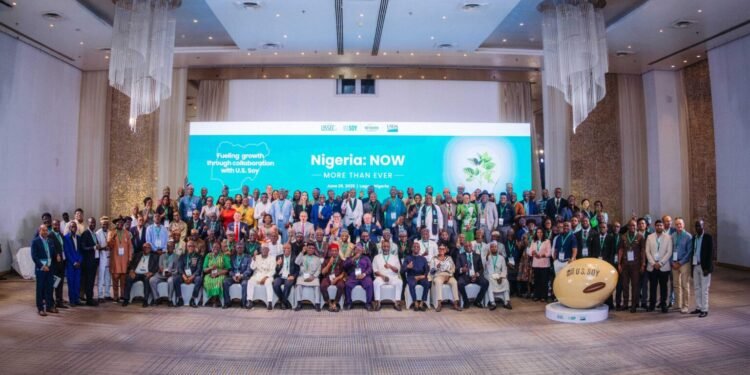US Soybean is playing a crucial role in addressing Nigeria’s protein deficiency and contributing to the nation’s economic development. Through a strategic partnership between the U.S. Soybean Export Council (USSEC) and the U.S. Mission in Nigeria, efforts are underway to bridge the country’s protein supply gap using high-quality US Soybean products.
At the recently held Nigeria: NOW conference in Lagos, organized by USSEC, stakeholders from government, agribusiness, and the nutrition sector gathered to explore how US Soybean can support Nigeria’s food security and long-term agricultural resilience. The event featured influential voices including nutritionists, poultry producers, and state officials.
Speaking at the conference, Acting U.S. Consul General JoEllen Gorg highlighted the strategic value of company in Nigeria’s food system. She stated that the collaboration is a “pivotal milestone” in promoting innovation and best practices that enhance food production, protein availability, and economic stability in Nigeria.

US soybean supports Nigeria’s protein supply and agricultural development through strategic trade partnerships.
Gorg emphasized that the mission’s partnership with USSEC is vital in helping U.S. soy exporters connect with Nigerian agribusinesses. These connections promote the use of US Soybean in both feed and food industries, while also training Nigerians in advanced agricultural practices.
Key Nigerian figures—including former President Olusegun Obasanjo, Oyo State Governor Seyi Makinde, and Lagos Commissioner for Agriculture Abisola Olusanya—attended the event, showing strong national support for increased collaboration with the US Soybean industry.
With a rapidly growing population exceeding 236 million, Nigeria faces a significant protein gap. Average daily protein intake stands at only 45.4 grams per person—well below the 60-gram minimum recommended by the FAO. Despite domestic soybean cultivation, local production, estimated at 1.15 million metric tons for the 2023/24 season, falls short of demand, especially in the animal feed sector.
ALSO READ:Peter Obi Declares 2027 Presidential Bid, Vows to Serve Only One Term
To meet this shortfall, Nigeria resumed US Soybean imports after a six-year pause, bringing in 62,100 metric tons this year. This renewed trade signals a deeper and more sustainable partnership with the US Soybean industry.
USSEC CEO Jim Sutter underscored the importance of trade and reaffirmed the company’s role as a reliable global supplier. Echoing this sentiment, U.S. Soybean farmer and United Soybean Director Robert Alpers expressed pride in supporting global food needs sustainably, noting that US Soybean producers are committed to reducing environmental impact while increasing yield.


